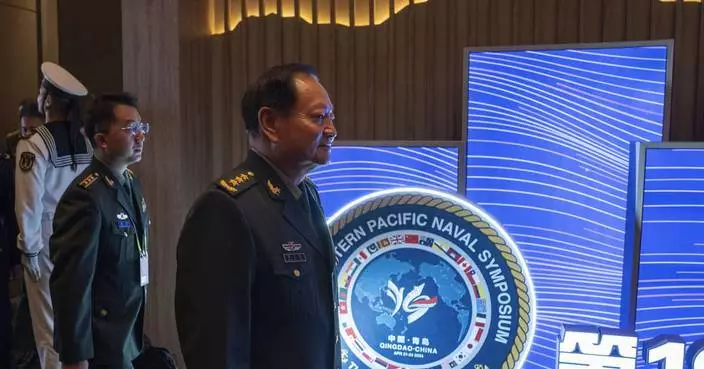President Donald Trump framed the U.S.-brokered cease-fire deal with Turkey as "a great day for civilization" but its effect was largely to mitigate a foreign policy crisis widely seen to be of his own making.
After hours of negotiation in Ankara, the two nations on Thursday agreed to a five-day cease-fire in the Turks' deadly attacks on Kurdish fighters in northern Syria. The Kurds were U.S. allies in the fight against the Islamic State but came under assault after Trump ordered U.S. troops to leave the area earlier this month.
The agreement requires the Kurds to vacate a swath of territory in Syria along the Turkish border in an arrangement that largely solidifies Turkey's position and aims in the weeklong conflict.
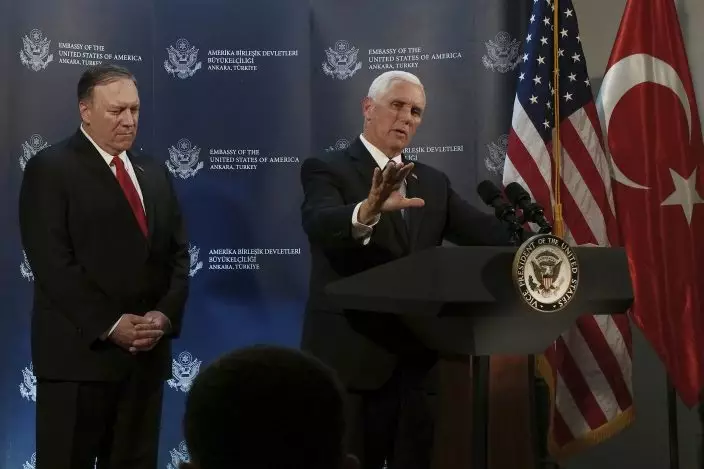
U.S Vice President Mike Pence, right, speaks at the U.S. ambassador's residence during a news conference with Secretary of State Mike Pompeo after their meeting with Turkish President Recep Tayyip Erdogan, in Ankara, Turkey, Thursday, Oct. 17, 2019. The U.S. and Turkey agreed to a five-day cease-fire in the Turks' attacks on Kurdish fighters in northern Syria to allow the Kurds to withdraw to roughly 20 miles away from the Turkish border. The arrangement appeared to be a significant embrace of Turkey's position in the weeklong conflict. (AP PhotoBurhan Ozbilici)
U.S. Vice President Mike Pence, who reached the deal with Turkish President Recep Tayyip Erdogan, hailed the agreement as the way to end the bloodshed caused by Turkey's invasion.
But he remained silent on whether it amounted to a second abandonment of America's former Kurdish allies, many of whom are branded as terrorists by Ankara. The deal includes a conditional halt to American economic sanctions and no apparent long-term consequences for Turkey for its actions.
Turkish troops and Turkish-backed Syrian fighters launched their offensive against Kurdish forces in northern Syria a week ago, two days after Trump suddenly announced he was withdrawing the U.S. military from the area.
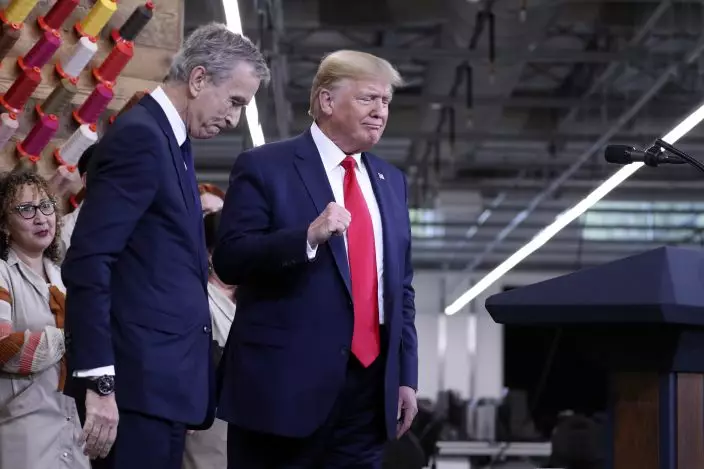
President Donald Trump arrives with Bernard Arnault, chief executive of LVMH during a ribbon cutting ceremony with at the Louis Vuitton Workshop Rochambeau in Alvarado, Texas, Thursday, Oct. 17, 2019. (AP PhotoAndrew Harnik)
Trump was widely criticized for turning on the Kurds, who had taken heavy casualties as partners with the U.S. in fighting IS extremists since 2016.
While U.S. officials have insisted that Trump did not authorize Turkey's invasion and only that he was not persuasive enough in making the case against it to Erdogan, the cease-fire codifies nearly all of Turkey's stated goals in the conflict.
Turkish Foreign Minister Mevlut Cavusoglu said the United States had accepted the idea of a "safe zone" long pushed by Turkey, and he insisted Turkish armed forces will control the zone. He also made clear that Turkey will not stop at a previously limited zone; he said Turkish control of the Syrian side of the border must extend all the way to the Iraqi border.
Caught in the middle, the commander of Kurdish-led forces in Syria, Mazloum Abdi, told Kurdish TV, "We will do whatever we can for the success of the cease-fire agreement." But one Kurdish official, Razan Hiddo, declared that Kurdish people would refuse to live under Turkish occupation.
Trump seemed to endorse the Turkish aim of ridding the Syrian side of the border of the Kurdish fighters. "They had to have it cleaned out," he said.
During a campaign rally in Texas Thursday night, Trump said, "Sometimes you have to let them fight, like two kids in a lot, you got to let them fight and then you pull them apart."
In the negotiations, a senior U.S. official said, Pence and national security adviser Robert O'Brien expressed condolences to Erdogan and his military commanders over their dead and injured in the week-long campaign.
Leading U.S. lawmakers were less than pleased than Trump.
Sen. Mitt Romney, the Republicans' presidential nominee in 2012, said he welcomed the cease-fire but wanted to know what America's role in the region would be and why Turkey was facing no consequences for its invasion.
"Further, the cease-fire does not change the fact that America has abandoned an ally," he said on the Senate floor.
A senior U.S. official insisted that the agreement was negotiated in consultation with Kurdish forces and Pence said the U.S. would "facilitate" the Kurds' pullout, but he did not say if that would include the use of American troops.
The Pentagon had no immediate comment.
As Pence was speaking in Ankara, U.S. troops were continuing to board aircraft leaving northern Syria. Officials said a couple of hundred had already departed, with hundreds more consolidated at a few bases waiting to move out.
Sen. Lindsey Graham, a Trump confidant who has criticized the president's pullout, said he thinks U.S. troops will be needed as part of an effort to implement and enforce a halt to the fighting.
"There's just no way around it," he said. "We need to maintain control of the skies" and work with the Kurds.
While the cease-fire seemed likely to temporarily slow legislation in Congress aimed at punishing Turkey and condemning Trump's U.S. troop withdrawal, lawmakers gave no sign of completely dropping the measures.
Shortly before the announcement of the pause in hostilities, Graham and Sen. Chris Van Hollen, D-Md., introduced legislation that would bar U.S. military aid to Turkey, seek to curb foreign arms sales to Ankara and impose sanctions on top Turkish officials unless Turkey withdraws its forces. Those sanctions would include a report on Erdogan's family assets.
In contrast with Pence's description of a limited safe zone, the agreement would effectively create a zone of control patrolled by the Turkish military that Ankara wants to stretch for the entire border from the Euphrates River to the Iraqi border, though the agreement did not define the extent of the zone. Turkish forces currently control about a quarter of that length, captured in the past nine days.
The rest is held by the Kurdish-led forces or by the Syrian government military, backed by Russia, which the Kurds invited to move in to shield them from the Turks. None of those parties has much reason to let Turkish forces into the areas.
But the agreement essentially gives the Turks what they had sought to achieve with their military operation in the first place.
After the Kurdish forces are cleared from the safe zone, Turkey has committed to a permanent cease-fire but is under no obligation to withdraw its troops. In addition, the deal gives Turkey relief from sanctions the administration had imposed and threatened to increase, meaning there will be no penalty for the operation.
Brett McGurk, the former civilian head of the administration's U.S.-led counter-IS campaign, wrote on Twitter that the deal was a gift to the Turks.
"The US just ratified Turkey's plan to effectively extend its border 30km into Syria with no ability to meaningfully influence facts on the ground," he wrote.
Danielle Pletka, vice president for foreign and defense policy studies at the American Enterprise Institute, tweeted, "This is a respite while we surrender to Turkish domination of Northeast Syria."
Erdogan had stated on Wednesday that he would be undeterred by U.S. sanctions. He said the fighting would end only if Kurdish fighters abandoned their weapons and retreated from positions near the Turkish border.
Before the talks, the Kurds indicated they would object to any agreement along the lines of what was announced by Pence. But Pence maintained that the U.S. had obtained "repeated assurances from them that they'll be moving out."
Trump's withdrawal of U.S. troops has been widely condemned, including by Republican officials not directly associated with his administration. Republicans and Democrats in the House, bitterly divided over the Trump impeachment inquiry, banded together Wednesday for an overwhelming 354-60 denunciation of the U.S. troop withdrawal.
AP writers Robert Burns, Deb Riechmann, Alan Fram, Darlene Superville, Lolita C. Baldor, Jill Colvin, Kevin Freking and Ellen Knickmeyer contributed from Washington.
KYIV, Ukraine (AP) — A big, new package of U.S. military aid will help Ukraine avoid defeat in its war with Russia. Winning will still be a long slog.
The arms and ammunition in the $61 billion military aid package should enable Ukraine to slow the Russian army's bloody advances and block its strikes on troops and civilians. And it will buy Ukraine time — for long-term planning about how to take back the fifth of the country now under Russian control.
“Ultimately it offers Ukraine the prospect of staying in the war this year,” said Michael Clarke, visiting professor in war studies at King’s College London. “Sometimes in warfare you’ve just got to stay in it. You’ve just got to avoid being rolled over.”
The U.S. House of Representatives approved the package on Saturday after months of delays by some Republicans wary of U.S. involvement overseas. It was passed by the Senate on Tuesday, and President Joe Bidensigned it into law on Wednesday.
The difference could be felt within days on the front line in eastern and southern Ukraine, where Russia’s much larger army has been slowly taking territory against massively outgunned Ukrainian forces.
The aid approval means Ukraine may be able to release artillery ammunition from dwindling stocks that it has been rationing. More equipment will come soon from American stocks in Poland and Germany, and later from the U.S.
The first shipments are expected to arrive by the beginning of next week, said Davyd Arakhamia, a lawmaker with Ukrainian President Volodymyr Zelenskyy’s Servant of the People party.
But opposition lawmaker Vadym Ivchenko, a member of the Ukrainian parliament’s National Security, Defense and Intelligence Committee, said logistical challenges and bureaucracy could delay shipments to Ukraine by two to three months, and it would be even longer before they reach the front line.
While details of the shipments are classified, Ukraine’s most urgent needs are artillery shells to stop Russian troops from advancing, and anti-aircraft missiles to protect people and infrastructure from missiles, drones and bombs.
What’s coming first is not always what front-line commanders need most, said Arakhamia, the Ukrainian lawmaker. He said that even a military giant like the U.S. does not have stockpiles of everything.
“The logic behind this first package was, you (the U.S.) finds our top priorities and then you see what you have in the warehouses,” Arakhamia said. “And sometimes they do not match.”
Hope for future breakthroughs for Ukraine still hangs on more timely deliveries of Western aid, lawmakers acknowledge.
Many experts believe that both Ukraine and Russia are exhausted by two years of war and won’t be able to mount a major offensive — one capable of making big strategic gains — until next year.
Still, Russia is pushing forward at several points along the 1,000-kilometer (600-mile) front, using tanks, wave after wave of infantry troops and satellite-guided gliding bombs to pummel Ukrainian forces. Russia is also hitting power plants and pounding Ukraine’s second-largest city, Kharkiv, which is only about 30 kilometers (some 20 miles) from the Russian border.
Ivchenko said the goal for Ukraine’s forces now is to “hold the line” until the bulk of new supplies arrive by mid-summer. Then, they can focus on trying to recapture territory recently lost in the Donetsk region.
“And probably ... at the end of summer we’ll see some movement, offensive movement of the Ukrainian armed forces,” he said.
Some military experts doubt Ukraine has the resources to mount even small offensives very soon.
The U.S. funding “can probably only help stabilize the Ukrainian position for this year and begin preparations for operations in 2025,” said Matthew Savill, director of military sciences at the Royal United Services Institute, a think tank.
In the best-case scenario for Ukraine, the American aid will give commanders time to reorganize and train its army — applying lessons learned from its failed summer 2023 offensive. It may also galvanize Ukraine’s allies in Europe to increase aid.
“So this just wasn’t about Ukraine and the United States, this really affected our entire 51-country coalition,” said U.S. Congressman Bill Keating, a Democrat who visited Kyiv on Monday as part of a four-member congressional delegation.
Zelenskyy insists Ukraine's war aim is to recapture all its territory from Russia — including Crimea, seized illegally in 2014. Even if the war ultimately ends through negotiation, as many experts believe, Ukraine wants to do that from as strong a position as possible.
Whatever happens on the battlefield, Ukraine still faces variables beyond its control.
Former U.S. President Donald Trump, who seeks to retake the White House in the November election, has said he would end the war within days of taking office. And the 27-nation Europe Union includes leaders like Hungarian Prime Minister Viktor Orbán and Slovak Prime Minister Robert Fico, who have opposed arming Ukraine.
Ukraine’s allies have held back from supplying some arms out of concern about escalation or depleting their own stocks. Ukraine says that to win the war it needs longer-range missiles it could use for potentially game-changing operations such as cutting off occupied Crimea, where's Russia's Black Sea fleet is based.
Ukraine especially wants a longer-range version of Army Tactical Missile Systems, known as ATACMS, from the U.S., along with Taurus cruise missiles from Germany. Both governments have resisted calls to send them because they are capable of striking targets deep within Russian territory.
The new bill authorizes Biden to send Ukraine ATACMS that have a range of some 300 kilometers (190 miles) “as soon as practicable.”
On Wednesday, American officials revealed that the U.S. already secretly transferred a number of the longer-range missiles to Ukraine last month, and they were used for the first time last week to strike an airfield in occupied Crimea. The officials spoke on condition of anonymity to discuss the delivery before it became public.
Meanwhile, Russia is using its advantage in troops and weapons to push back Ukrainian forces, perhaps seeking to make maximum gains before Ukraine's new supplies arrive.
For weeks it has pummeled the small eastern city of Chasiv Yar, suffering heavy losses. Britain's Ministry of Defense says 900 Russian troops are being killed or injured a day in the war.
Capturing the strategically important hill town would allow them to move toward Sloviansk and Kramatorsk, key cities Ukraine controls in the eastern region of Donetsk. It would be a significant win for Russian President Vladimir Putin, who Western officials say is bent on toppling Ukraine’s pro-Western government.
Russian pressure was aimed not just at gaining territory, but on undermining Zelenskyy and bolstering critics who say his war plan is failing, said Clarke of King's College London.
The U.S. aid package decreases the likelihood of a political crisis in Ukraine, and U.S. Speaker Mike Johnson deserves credit for pushing it through Congress, he said.
"He held history in his hands,” Clarke said.
This story has been updated to correct Orbán's title, the Slovak prime minister's name and that the British estimate of daily Russian losses is for the war, not one battle.
Associated Press writers Lolita C. Baldor and Tara Copp contributed from Washgington.
Follow AP’s coverage of the war in Ukraine at https://apnews.com/hub/russia-ukraine
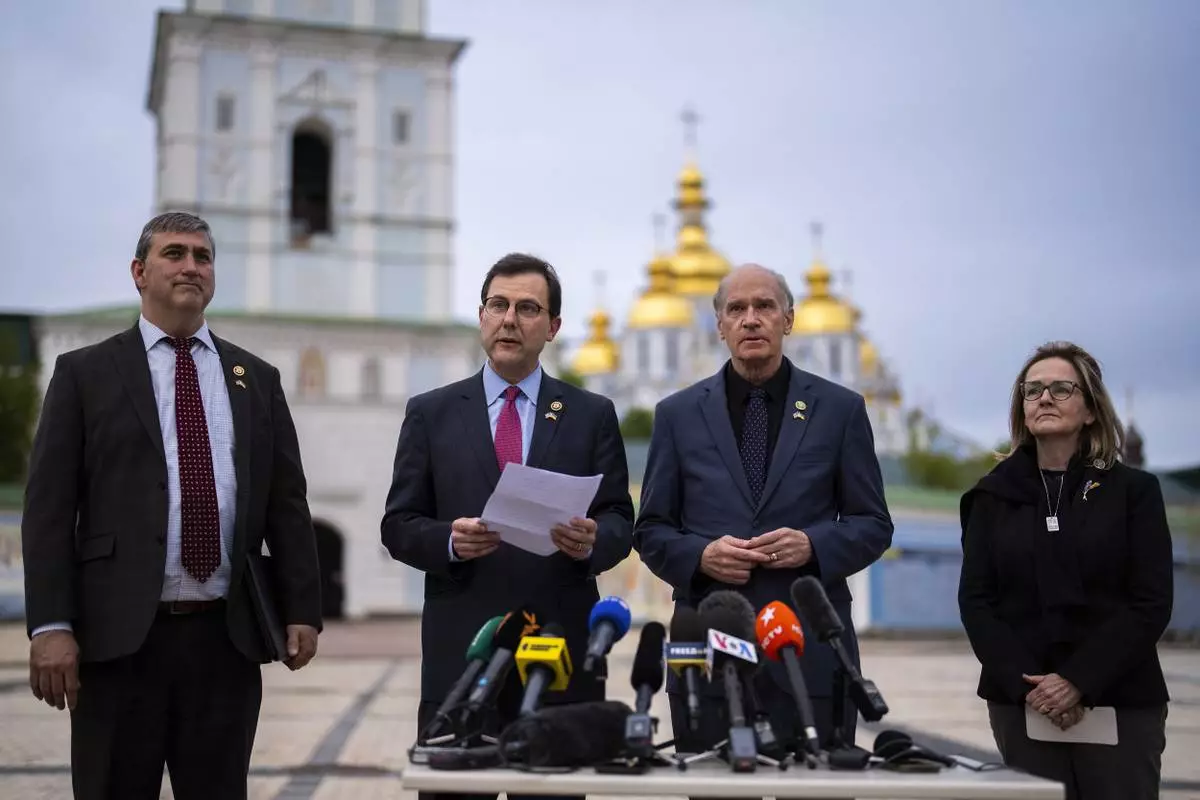
From left, U.S. representatives Nathaniel Moran, R-Tx, Tom Kean Jr, R-NJ, Bill Keating, D-Mass, and Madeleine Deane, D-Pa, talk to journalists during a joint news conference outside Saint Michael cathedral in Kyiv, Ukraine, Monday, April 22, 2024. A newly approved package of $61 billion in U.S. aid may prevent Ukraine from losing its war against Russia. But winning it will be a long slog. (AP Photo/Francisco Seco)
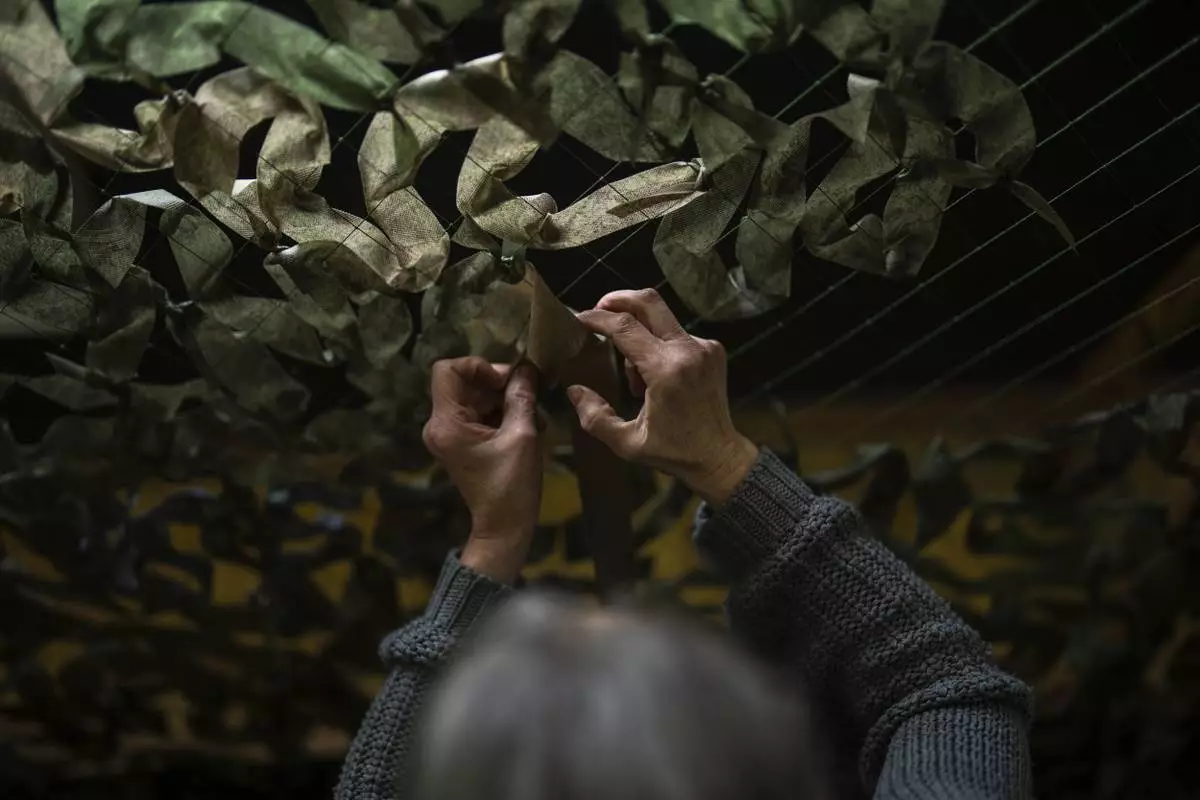
A volunteer makes a camouflage net at a facility producing material for Ukrainian soldiers in Kyiv, Ukraine, Monday, April 22, 2024. A newly approved package of $61 billion in U.S. aid may prevent Ukraine from losing its war against Russia. But winning it will be a long slog. (AP Photo/Francisco Seco)
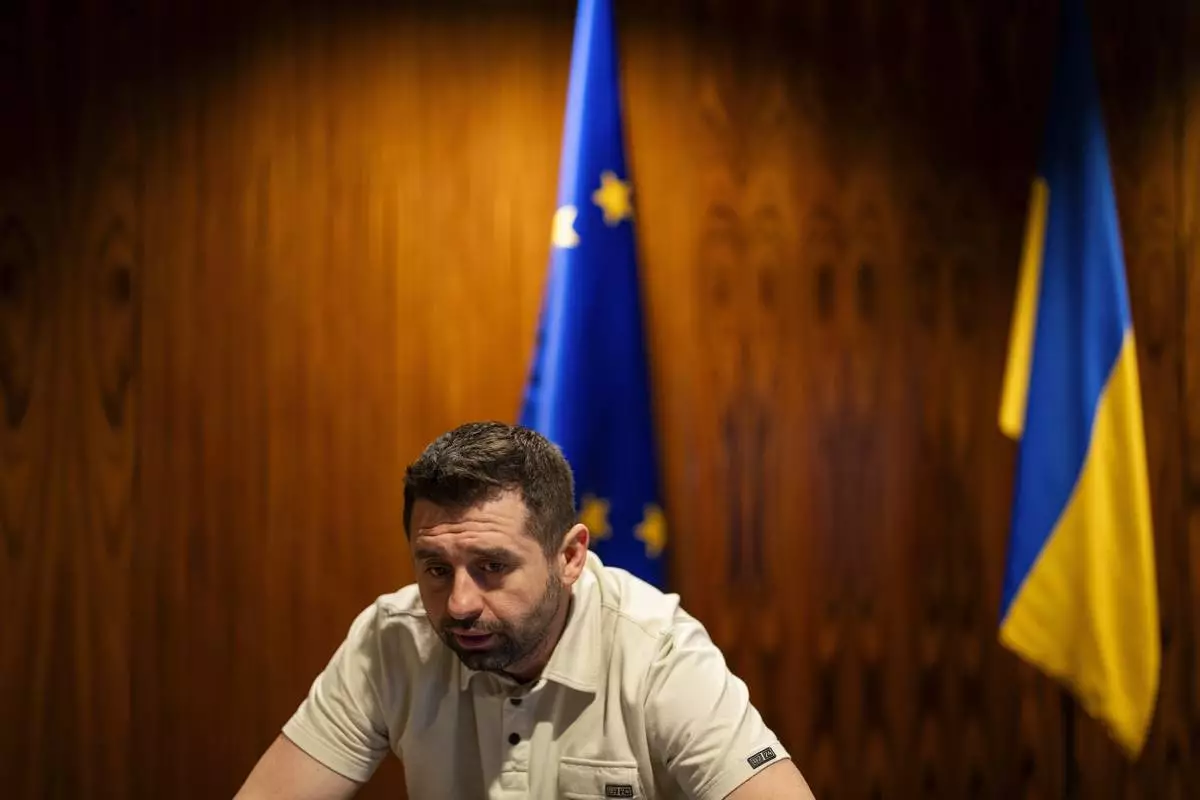
Davyd Arakhamia, a lawmaker with Ukrainian President Volodymyr Zelenskyy's Servant of the People party, talks during an interview with Associated Press in Kyiv, Ukraine, Monday, April 22, 2024. (AP Photo/Francisco Seco)
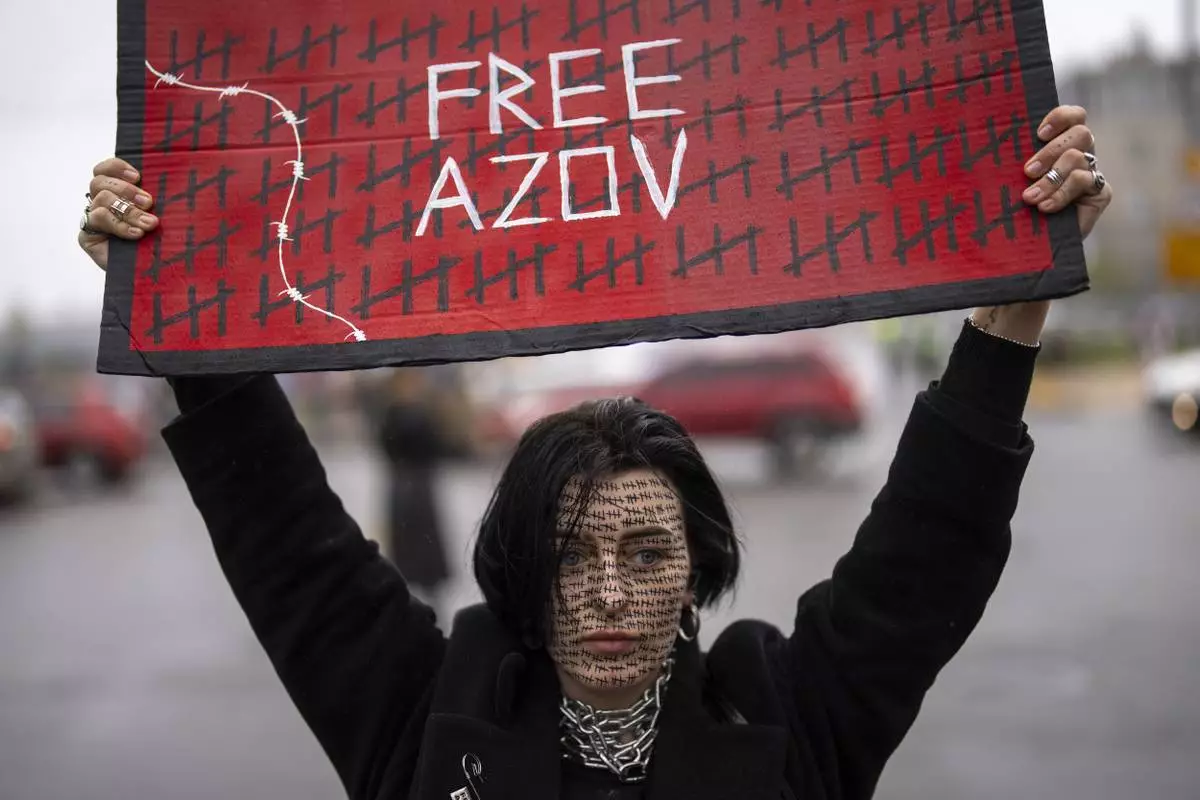
A woman rallies to raise awareness on the fate of Ukrainian prisoners of war in Kyiv, Ukraine, Sunday, April 21, 2024. (AP Photo/Francisco Seco)
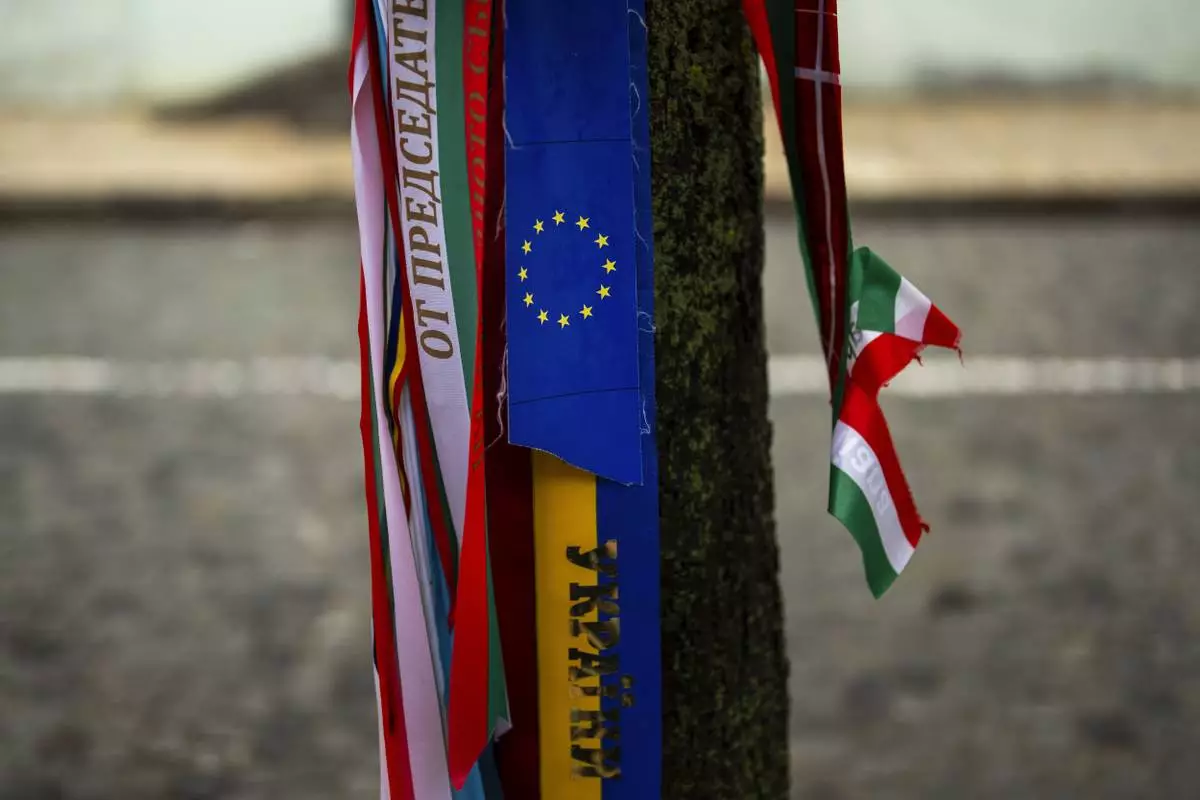
Ribbons with the colors of the European Union and Ukraine are attached to a tree next to memorial wall of Ukrainian soldiers killed during the war in Kyiv, Ukraine, Monday, April 22, 2024. (AP Photo/Francisco Seco)
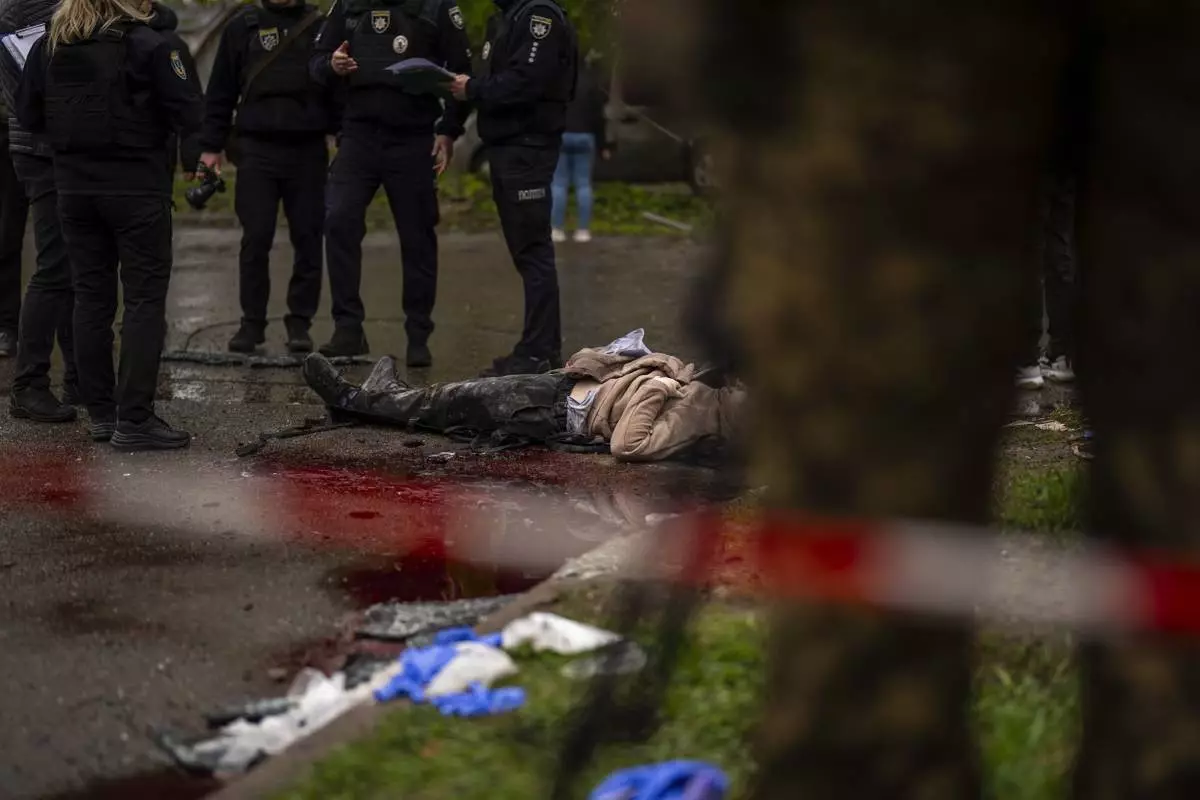
The body of a woman killed by Russian bombardment in Chernihiv, Ukraine, Wednesday, April 17, 2024. (AP Photo/Francisco Seco)

Soldiers carry the coffins of two Ukrainian army sergeants during their funeral in Lviv, Ukraine, Tuesday, April 16, 2024. (AP Photo/Francisco Seco)


















